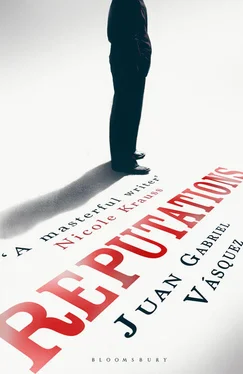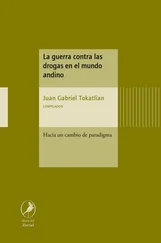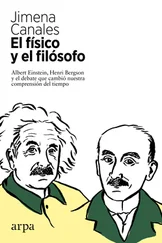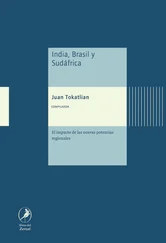Mallarino, without knowing why, began to address her familiarly. ‘There, there,’ he said. ‘Get dressed. Everything’s going to be OK.’
She sat up and folded her knees to her chest, hugged her legs. ‘I didn’t ask for this,’ he heard her say. ‘I was perfectly fine.’ Mallarino read the shame in her voice, and the exhaustion, and the bitterness and the terrible vulnerability.
‘Everything’s going to be fine,’ he told her. He stroked her hair. He desired her, and detested himself for desiring her. He looked towards the doorman’s booth to see whether the doorman had noticed anything. On the grey tree trunk somebody had engraved, with a knife, two names and a heart. ‘PAHY’, he read, before realizing that it wasn’t an H, but two Ts crossed with the same horizontal stroke.
‘Get dressed,’ he said to Samanta. ‘Go upstairs, get a bit of sleep. I’ll see you at three.’
* * *
Magdalena thought that having lunch there, a few steps away from the Matisse and Giacometti and Klimt drawings, would be exciting for Mallarino: judging by his reputation as an anchorite, as an old-sage-hidden-in-the-mountains, he no longer frequented the neighbourhood of La Candelaria as much as he used to in the old days, much less this museum, which still today, ten years after opening, shone as if it were brand-new. Magdalena had called that morning and reserved a table on the patio in the courtyard, but now she regretted it; after the rain, the Bogotá sky had cleared as if a curtain had fallen away, and now the midday light shone brightly on the high white walls, the aluminium tables, the paper place mats, and blinded the diners. They had walked there from Fifth Avenue, while she told him about the programme she’d recorded the previous afternoon and he complained about the filthy smells: the fried-food stands reusing the same oil over and over again but also the street dogs, the homeless people’s blankets beside building entrances, and also the shit, the shit that appeared by surprise on the corners, the origin of which it was best not to imagine. That assault on his senses contrasted strongly with the memory, still recent and raw, of what had happened with Samanta Leal. He mustn’t talk about that. He had to keep it to one side: there, in another world, in an alternative world with incomprehensible rules. Coming in through the Eleventh Street entrance, up the tall step and around Botero’s dark bronze hand, Mallarino had already made the decision not to talk about what he’d seen and heard back in the house in the mountains since the last time he was with Magdalena. One day had gone by, not much more than a day: centuries and centuries had come and gone. Now the sun was shining on the white walls and dazzling them and the waiter had brought a bottle of white wine, but white wine was not white, but golden: wine is sunlight held together by water. Where had he heard that before? Maybe Magdalena would remember, she was good at things like that. Now she was pouring the wine, and enjoying doing so; her short haircut suited her strong-boned face, her cheeks straight out of a Pre-Raphaelite painting, her nose that descended from her eyebrows in a long elegant line. Trying all the time to keep at bay the bothersome images, the interfering words, he thought of Samanta Leal. If he didn’t mention her, if he didn’t mention the last few hours or the 3 p.m. appointment, maybe this time in Magdalena’s company could turn into a necessary and urgent moment of tranquillity. Let the world stop spinning: that’s all he asked. Let it stop revolving, let everyone be quiet. Yes, let there be a little silence so he could just hear this voice that was talking to him now, that husky and still smooth voice, the voice of a cello, one of those voices that paralyse a hand about to turn a dial, that translate the chaos of the world and convert its obscure jargon into a diaphanous tongue. Interpret this world for me, Magdalena, tell me what’s happening to us and what might happen now, what could happen to me now and what could happen to Samanta Leal, tell me how to remember what hasn’t happened yet. And suddenly there was that phrase again that kept coming back to him like a fibre of meat stuck in his teeth.
‘“It’s a poor sort of memory that only works backwards,”’ recited Mallarino. ‘Who said that?’
Magdalena chewed a couple of times.
‘The White Queen says it to Alice,’ she said: her mouth half-full, her lively eyes smiling. ‘Beatriz loved that book, I don’t know how many times we read it.’
But Beatriz was not here. Beatriz was away on a trip, Beatriz was always away, Beatriz never stopped, perhaps out of fear of not being able to take off again if she did. The White Queen says it to Alice. Beatriz loved that book. Yes, he’d read it to her too once or twice, or at least a few pages, and he remembered having seen her — in a hammock, on holiday — reading it by herself when she was old enough. The image of his daughter reading always moved him, perhaps because he saw on her face the same signs of intense concentration he already knew from Magdalena’s face, the same arrangement of muscles between the eyebrows and around the lips, and he couldn’t help but wonder about the purpose of such inherited traits, what evolutionary aim could be served by daughters making the same gestures as their mothers when a tale interested them. Beatriz loved that book: Magdalena had remembered: Magdalena always remembered.
‘Have you heard from her?’ Mallarino asked.
‘Yes. She wrote to me a couple of days ago. One piece of good news and one bad.’
‘Let’s see,’ said Mallarino. ‘Bad news first.’
‘They’re splitting up.’
‘That’s the good news.’
‘Don’t joke,’ said Magdalena. ‘She’s going through a tough time, poor thing. You should be thankful they don’t have kids.’
‘I’m thankful,’ said Mallarino. ‘So what’s the good news then?’
‘She’s coming to live in Colombia.’
‘But she already lives in Colombia.’
‘All right. She’s staying put in Colombia.’
‘What does that mean?’
‘She requested a transfer. I don’t know what it’s called, she didn’t really explain. She asked not to move around all the time. She asked to stay here.’
‘In Bogotá?’
‘No, no. In a place where she’s needed, Javier. Down in Meta. Or up in Cesar.’
‘She doesn’t know where?’
‘Not yet. She knows they’ll grant her the transfer, but she doesn’t know where she’ll be sent. She won’t be in Bogotá, that’s for sure. But we’ll see more of her.’
‘How do you know?’
‘Because she told me. She told me we’d see her more often. She said: “We’ll see more of each other.” She said she’s been feeling lonely, that she’d been feeling lonely for months. And she would have told you the same, if you had a computer.’
But Mallarino realized it wasn’t a serious reproach: it was a game, a friendly wink, a dig in the ribs. Her infallible instinct told Magdalena that this was not a moment for serious reproaches. What had she noticed? How had she noticed? Oh, but that was Magdalena: a sublime reader of reality, and especially that circumscribed and impoverished reality, that melancholy and daunted reality that was Mallarino. ‘Well, we’ll keep her company,’ he said. ‘She’s not going to be lonely here.’ Beatriz’s husband was the youngest son of a family of conservative, Catholic Popayán landowners, who had a reputation, as far as Mallarino knew, of being on the wrong side since the beginning of the years of political violence. ‘I know more or less what that family’s like,’ Mallarino had said to her once, ‘and I don’t much like you going out with him.’ ‘Well, his family knows exactly who you are,’ answered Beatriz. ‘And they don’t like him going out with me at all.’ And now, a few years after that conversation and many after her own parents’ separation, Beatriz was splitting up with her husband. Juan Felipe Velasco, was his name: a blond guy with a cleft chin who crossed himself every time he was about to drive somewhere. Beatriz had learned to cross herself with him, and would have taught their children to cross themselves if they’d had any; but they hadn’t had any, and that was lucky; and now they were splitting up, they too were worn down by the diverse strategies life has to wear lovers down, too many trips or too much togetherness, the accumulated weight of lies or stupidity or lack of tact or mistakes, the things said at the wrong time and with immoderate or inappropriate words or those which, perhaps not finding appropriate or moderate words, were never said, or worn down too by a bad memory, yes, by the inability to remember what’s essential and live within it (to remember what once made the other happy: how many lovers had succumbed to that negligent forgetting), and by the inability, as well, to get ahead of all that wearing down and deterioration, get ahead of the lies, the stupidity, the lack of tact, the mistakes, the things that shouldn’t be said and the silences that should be avoided: to see all that, see it all coming from way off, see it coming and step aside and feel it blow past like a meteorite grazing the planet. See it coming, thought Mallarino, and step aside. For an indigenous tribe in Paraguay, or maybe it was Bolivia, the past is what is in front of us, because we can see it and know it, but the future is what is behind: what we do not see and cannot know. The meteorite always comes from behind, we don’t see it, we can’t see it. You need to see it, see it coming and step aside. You need to face the future. It’s a poor sort of memory that only works backwards.
Читать дальше












